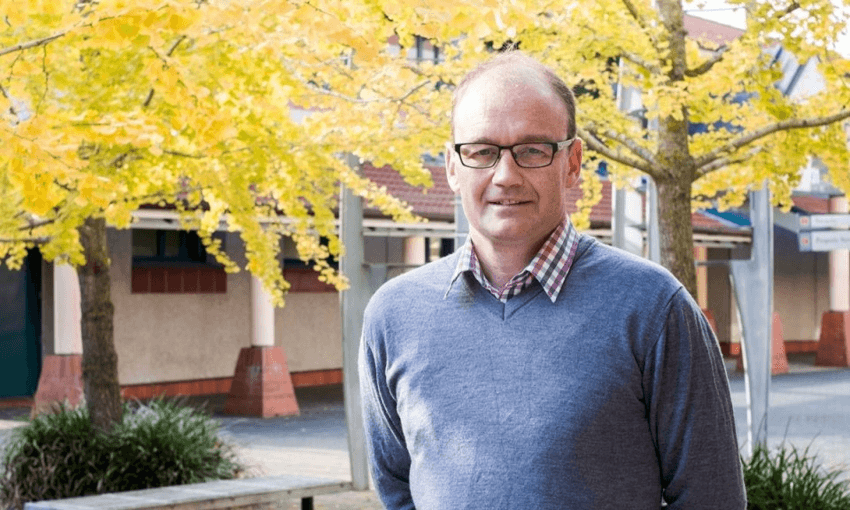The withdrawal follows harsh criticisms of the controversial University of Auckland academic’s article by the head of the School of Population Health in which he works.
The contrarian epidemiologist and “Plan B” leader Simon Thornley has retracted a widely criticised paper that wrongly claimed there was a higher incidence of miscarriage among those who had received Covid vaccinations. It follows an email from Professor Robert Scragg, the head of the School of Population Health at Auckland University, which urged Thornley and his co-author, Aleisha Brook, to “immediately publicly retract their article”. Such an intervention is almost unheard of in academia.
Thornley told The Spinoff that he had issued a correction to the paper last week, but that “following the [Scragg] letter, I have decided to withdraw it”. He refused to comment further on the faulty methodology and the impact of the paper, published in a journal that regularly promotes anti-vaccination misinformation and which has been widely shared among anti-vaccination groups. The journal that published the article is edited by an American anti-vaccination campaigner who is a prominent advocate for the debunked theory that MMR vaccines can cause autism
In the letter to colleagues, Scragg wrote: “I am taking the extraordinary step in my regular Covid email to publicly criticise a recent publication by a member of staff, because of the public furore this article has created and to confirm with staff that I do not agree with the findings from the article.”
Scragg noted the story in the Sunday Star Times, headlined ‘A paper on vaccination in pregnancy co-authored by Simon Thornley has been panned by experts around the world’, which explained a fundamental mathematical failing involving the use of the wrong denominator, on which the findings hinged. That “major error”, wrote Scragg, “led them to conclude that 80-90% of pregnant women will miscarry if they have the Covid-19 vaccination”. The sound evidence, he noted, “indicates that the miscarriage percent in vaccinated women is no different to unvaccinated”.
He added: “Brock and Thornley should immediately publicly retract their article because of the anxiety it is creating for expectant parents and those planning to have a child.” The Thornley article, published in “a low ranking non-indexed journal” was utterly at odds with reliable research, he said. “The safety of the Covid-19 vaccine in early pregnancy has been confirmed by a large study published by Jama by Kharbanda and colleagues.”
Thornley’s commentary on Covid-19 and vaccination has been roundly and routinely criticised by public health experts. He was keynote speaker at an event held by anti-vaccination group Voices for Freedom and has given evidence in support of a court case led by Nelson lawyer Sue Grey that sought to halt the vaccine rollout. In May, Thornley threatened legal action against The Spinoff and University of Auckland microbiologist and New Zealander of the Year Siouxsie Wiles over an opinion piece headlined “There’s a lot of vaccine BS around. Here’s why I won’t be debunking it”.
Thornley appeared last week on a Facebook livestream with former National MP Matt King, replete with themes familiar in anti-vaccination groups, prompting National leader Judith Collins to distance herself from her former colleague.
Epidemiologist Rod Jackson, a colleague of Thornley’s at the University of Auckland, told RNZ: “This is a severe disease and we have an evidence-based treatment where there is definitive evidence that it reduces the risk of severe disease and death by 95%, in that order. And we have someone who is questioning that evidence, who doesn’t know what they’re talking about, talking to an epidemiologist who doesn’t know what he’s talking about. I think it’s dangerous, because people could die.”
In a statement responding to questions from The Spinoff, a spokesperson for the UOA vice chancellor, Dawn Freshwater, said: “While the University supports academic freedom, we do require research to be conducted with a high degree of integrity. We have heard from many people who are concerned about Dr Thornley’s publications and the potential impacts these may have on public health.”
The statement strikes a different chord to that provided to Stuff at the end of last week, which noted that “as an academic staff member at the University of Auckland, Dr Thornley has the right to exercise his academic freedom.”
Asked about discussions with the academic about his Covid-19 commentary, the spokesperson said: “Dr Thornley is an employee of the university and our policy is not to speak publicly on employment matters, so we will not be commenting further at this time.”
This article was updated on November 18 to include a response from the University of Auckland.
